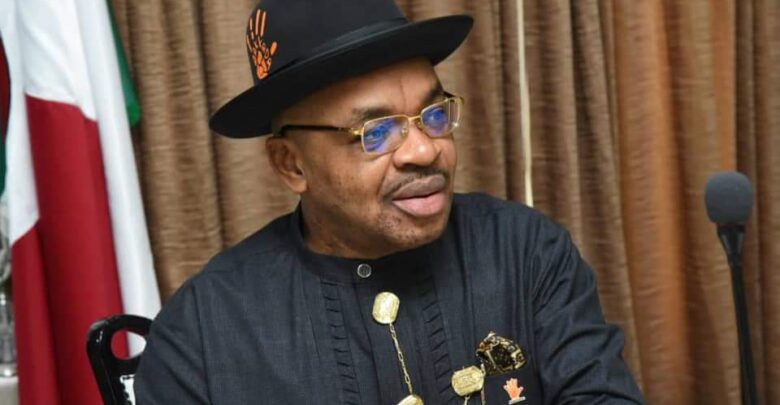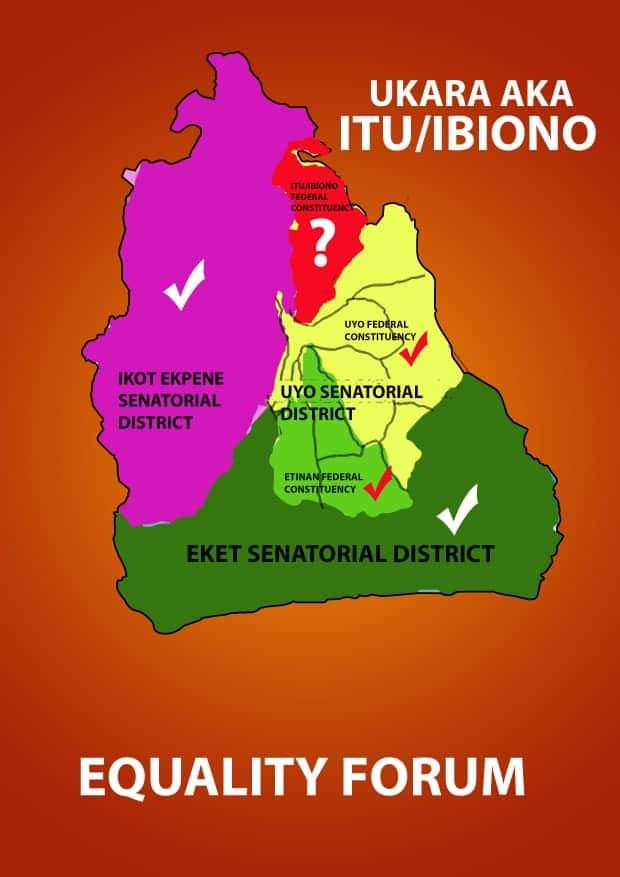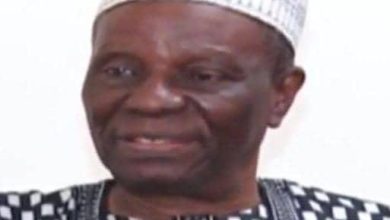
Any conversation on zoning is bound to arouse and polarise public opinion. However, heaven forbid that we scrap the current zoning system in Akwa Ibom and allow the next governor of the state in 2023 to come from elsewhere other than the Itu/ Ibiono Ibom Federal Constituency.

I understand that loads of people may not subscribe outrightly to zoning—defined as the sharing, rotating or shifting of political office(s) from one section to the other, sometimes based on regional, ethnic, or religious lines — as they believe merit alone should determine the choice of who succeeds Governor Udom Emmanuel.
Nonetheless, Akwa Ibom has a proud history of political justice and fair play. And the long-standing colour ought not to change in the case of Itu/ Ibiono Ibom, a minority federal constituency in the Akwa Ibom North-East (Uyo) Senatorial District.
In the coming paragraphs, I write to throw light on why depriving the federal constituency of the chance to lead the state in 2023 may not augur well for the polity, in the spirit of fairness, justice and equity.
The Covenant
Akwa Ibom State, created in 1987, has three senatorial districts. The other two are Akwa Ibom North-West (Ikot Ekpene) and Akwa Ibom South (Eket) senatorial districts. Beginning from 1999 — when Nigeria once again gave democracy a chance, paving the way for people to have their say at the polls (if at all their votes counted) — the three districts, taking turns, have each ascended to the Hilltop Mansion, which is the state government’s seat of power.
First, it was Arc. Obong Victor Attah from the North-East Senatorial District. Obong Attah, 82, led Akwa Ibom from 1999 to 2007. Eight years! The incumbent governor, Deacon Emmanuel, 55, from the South Senatorial District, who succeeded Senator Godswill Akpabio of the North-West Senatorial District in 2015, after the latter had also governed for eight good years, is set to wind down his tenure in less than 700 days.
The seamless transition of power through the Uyo-Ikot Ekpene-Eket axis took place thanks to an informal pact or covenant, if we may call it; that came into force at the tail end of Obong Attah’s reign. As a power broker, the 82-year-old was approached by the North-West Senatorial District which argued that the governorship seat in 2007 should be rotated to the district that had been starved in that regard since General Ibrahim Babangida (rtd), a former head of state, created Akwa Ibom. He obliged, facilitating the emergence of the now – Minister of Niger Delta Affairs. And as earlier mentioned, after Senator Akpabio’s eight years ended in 2015, the South, (Eket) Senatorial District took over in the person of the incumbent, Governor Emmanuel.
Related: 2023 Power Equation: Doesn’t Itu/Ibiono Deserve A Fair Share?
The big question
Now, nobody is tussling over which senatorial district should take over power after the South (Eket), because it can be seen in black and white that the North-East (Uyo) district fits the bill. By 2023, the district would have waited patiently for 16 years to assume office once more.
However, here comes the big question: which federal constituency in the Akwa Ibom North-East senatorial district deserves to produce the next governor?
Normally, we shouldn’t require a rocket scientist to figure out the answer to this question. Here is why:
The Akwa Ibom North-East Senatorial District comprises three federal constituencies: Etinan, Uyo and Itu. Out of the three, two have governed the state, being Etinan and Uyo. From Etinan/Nsit Ubium/Nsit Atai Federal Constituency, came the first indigenous military administrator in Akwa Ibom, Late Air Commodore Otuekong Idongesit Nkanga, who held sway from September 1990, ruling the state for more than 17 months. The then-Babangida regime in a bid to restore democracy allowed for elections of civilian governors for each state in Nigeria. This produced the late Obong Akpan Isemin, a hotshot politician who became the first civilian governor of Akwa Ibom in 1992. Obong Isemin was from the Etinan/Nsit Ubium /Nsit Ibom Federal Constituency. Although his time in office was cut short owing to the military coup that brought Late General Sani Abacha to power, he spent nearly two years in office.
Obong Attah, whose 8-year stay in office did not only unite Akwa Ibom people but spread development across the fabrics of the state, emerged from the Ibesikpo Uyo/Ibesikpo Asutan/Nsit Atai/Uruan/ federal constituency.
Zoning, the answer
In the light of the fact that the Itu/Ibiono Ibom people have yet to produce a governor in Akwa Ibom, it would smack of injustice and inequity if the Federal Constituency is done the dirty come 2023. Bitterly, the body language and pre-election posturing of some stakeholders and other people that matter in the upcoming 2023 elections appears to show some dreary signs. It seems as though some elements are racing to short-change the people of Itu/Ibiono Ibom Federal Constituency who have endured over the years as their region, by and large, have been mostly side-lined.
But the outlook is not bleak. The 55-year-old incumbent governor has antecedents that show he is a respecter of zoning. Recently, after President Muhammadu Buhari approved the establishment of a Federal University of Science and Technology in Akwa Ibom State, there were heated debates online and offline surrounding the senatorial district that the proposed institution should be sited. After the dust had settled, zoning solved the puzzle. The Deacon Udom Emmanuel-led government, in explaining its decision, proclaimed, “The decision by the State Government to site the new federal tertiary institution in Eket Senatorial District was informed by the presence of federal tertiary institutions in Uyo and Ikot Ekpene Senatorial Districts (the University of Uyo and the Federal Polytechnic, Ukana)”.
Related: Akwa Ibom Governorship 2023: Itu/ Ibiono Ibom Have A Good Case
Furthermore, the governor in 2018 while touring the state as he sought the peoples’ vote to win a second term, told a huge crowd in Abak Township Stadium, Abak that the Peoples Democratic Party (PDP) would not treat zoning with levity. In his words, “For those of you wearing campaign T-shirts, also carrying posters, do ensure zoning favours your principal. Because we will ensure zoning is respected based on the fact that justice and equity brings peace, orderliness and harmony in the Party which we must all embrace”.
By the same token, his party, the PDP, has a clear position on zoning, as enshrined in its constitution. Quoting it word for word, the PDP says it wants to adhere to “the policy of the rotation and zoning of Party and Public elective offices in pursuance of the principle of equity, justice and fairness (PDP Constitution, 2014)”.
I may be wrong, but I reckon Deacon Emmanuel is the number one governor in the history of Akwa Ibom who has repeatedly displayed his love and trust in God, the maker and creator of the world who Himself stands for equity and justice. Therefore, if other governors (like Attah and Akpabio) – who by no means are not less righteous – could honour and respect the zoning formula in the spirit of justice and fair play, then how much more the deacon who is the product of zoning and who has made it clear he won’t impose anybody on the people of Akwa Ibom.
“We have gone too far ahead to retreat,” the governor said recently. “So, as you are engaging in prognostications, creating camps of loyalty and getting consumed by who you think my successor would be, always bear these thoughts in your mind. God is doing great things in our State and that invisible Hand will continue to steer the ship of this state and will not bring anyone who will negate our gains.”
His position also means that the successor should not ascend the throne in a manner that would “negate the gains” of justice and equity achieved in the state through zoning which has brought a sense of belonging and cemented the different parts of Akwa Ibom together.
Zoning, here to stay
Zoning (or micro-zoning) of public offices exemplifies a positive trend in politics and governance. Pieces of evidence abound that zoning has fostered an all-around development in our society. It allows the voices of minorities to be heard and gives them a chance to have a say in matters that affect them.
For example, the Ikono/Ini Federal Constituency would have found it extremely difficult – if not impossible – to produce a senator in 2007. But without triggering much sweat, Senator Aloysius Etuk emerged to represent the Akwa Ibom North-West Senatorial District in the National Assembly thanks to zoning. The senatorial district which is dominated by the Annangs (the second-largest ethnic group in the state) has 10 local government areas, with only Ikono and Ini being the only Ibibios.
Read Also: Guber 2023: Settling the Zoning Question
As exemplified above, the problem with non-zoning, as most people would likely agree, is that it has lasting effects that include increased marginalisation of minorities. For this reason, those who dismiss zoning as neither here nor there are only championing for a section of the polity to dominate others.
Therefore, if we do not commit ourselves to respect the laid down formula – to see that each part of Akwa Ibom is given the chance to contribute to the development of the south-south state—we may reap a whirlwind of anger and an ever-widening division.
Ita Abia writes from Etinan
_itautiohabia@gmail.com
08061382544




